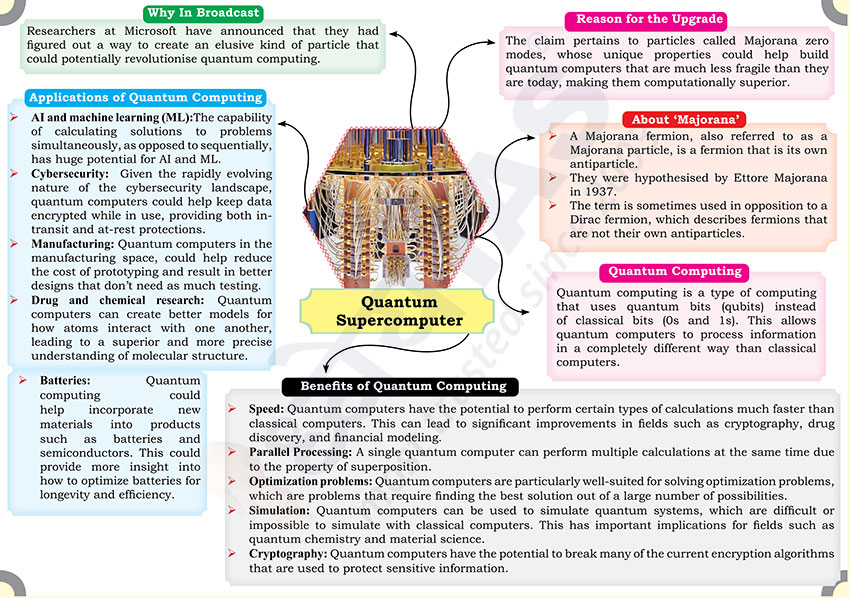Brain-booster /
01 Aug 2023
Brain Booster for UPSC & State PCS Examination (Topic: Quantum Supercomputer)

Why in Broadcast?
- Researchers at Microsoft have announced that they had figured out a way
to create an elusive kind of particle that could potentially revolutionise
quantum computing.
Reason for the Upgrade
- The claim pertains to particles called Majorana zero modes, whose unique
properties could help build quantum computers that are much less fragile
than they are today, making them computationally superior.
About ‘Majorana’
- A Majorana fermion, also referred to as a Majorana particle, is a
fermion that is its own antiparticle.
- They were hypothesised by Ettore Majorana in 1937.
- The term is sometimes used in opposition to a Dirac fermion, which
describes fermions that are not their own antiparticles.
Quantum Computing
- Quantum computing is a type of computing that uses quantum bits (qubits)
instead of classical bits (0s and 1s). This allows quantum computers to
process information in a completely different way than classical computers.
Benefits of Quantum Computing
- Speed: Quantum computers have the potential to perform certain
types of calculations much faster than classical computers. This can lead to
significant improvements in fields such as cryptography, drug discovery, and
financial modeling.
- Parallel Processing: A single quantum computer can perform
multiple calculations at the same time due to the property of superposition.
- Optimization problems: Quantum computers are particularly
well-suited for solving optimization problems, which are problems that
require finding the best solution out of a large number of possibilities.
- Simulation: Quantum computers can be used to simulate quantum
systems, which are difficult or impossible to simulate with classical
computers. This has important implications for fields such as quantum
chemistry and material science.
- Cryptography: Quantum computers have the potential to break many
of the current encryption algorithms that are used to protect sensitive
information.
Applications of Quantum Computing
- AI and machine learning (ML): The capability of calculating
solutions to problems simultaneously, as opposed to sequentially, has huge
potential for AI and ML.
- Cybersecurity: Given the rapidly evolving nature of the
cybersecurity landscape, quantum computers could help keep data encrypted
while in use, providing both intransit and at-rest protections.
- Manufacturing: Quantum computers in the manufacturing space,
could help reduce the cost of prototyping and result in better designs that
don’t need as much testing.
- Drug and chemical research: Quantum computers can create better
models for how atoms interact with one another, leading to a superior and
more precise understanding of molecular structure.
- Batteries: Quantum computing could help incorporate new materials
into products such as batteries and semiconductors. This could provide more
insight into how to optimize batteries for longevity and efficiency.








